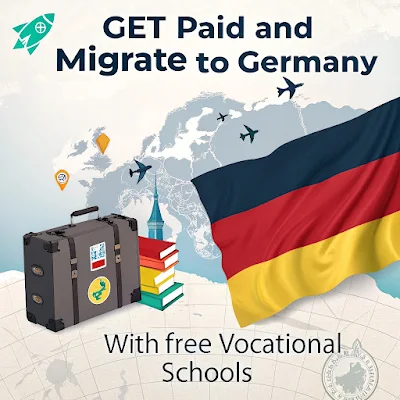The Technical
University of Dortmund (TU Dortmund) is one of Germany’s leading public
research universities, celebrated for its interdisciplinary approach to
education and innovation. Located in the vibrant city of Dortmund in North
Rhine-Westphalia, TU Dortmund seamlessly blends tradition with modernity, offering
students a wide range of academic programs, cutting-edge research
opportunities, and a dynamic campus life. This guide provides an in-depth look
at TU Dortmund, covering its history, academic offerings, research strengths,
campus life, admission process, and career prospects.
Overview of TU Dortmund
History, Mission, and Values
Founded in 1968, TU
Dortmund has evolved into a powerhouse of technological innovation and
interdisciplinary learning. Initially established with a focus on engineering
and natural sciences, the university has expanded to include humanities, social
sciences, and economics. Its mission is to promote research-driven teaching,
foster innovation, and address global challenges through collaboration and
sustainability.
Guided by values such
as academic excellence, diversity, and social responsibility, TU Dortmund
prepares students to thrive in a rapidly changing, technology-driven world.
Academic Reputation and Rankings
TU Dortmund is
consistently ranked among Germany’s top universities, particularly for its
programs in engineering, natural sciences, and technology. It is recognized
globally for its interdisciplinary approach and innovative research. The
university’s strong international partnerships and commitment to cutting-edge
education further enhance its reputation.
Academic Programs
TU Dortmund offers a
diverse range of programs at the undergraduate, graduate, and doctoral levels,
catering to students with varied academic interests and career goals.
Undergraduate and Graduate Programs
- Engineering and Technology: Mechanical engineering, electrical engineering, civil
engineering, and computer engineering.
- Natural Sciences:
Physics, chemistry, biology, mathematics, and environmental sciences.
- Humanities and Social Sciences: History, sociology, education, political science, and
economics.
- Business and Economics: Programs integrating technology and business with a
global perspective.
The university
emphasizes interdisciplinary learning, allowing students to explore innovative
academic pathways.
International Programs and Partnerships
TU Dortmund is a
global hub for collaboration, with partnerships spanning universities across
Europe, North America, and Asia. These partnerships facilitate student exchange
programs, dual-degree options, and joint research initiatives. International
students benefit from English-taught programs and a supportive, inclusive
learning environment.
Research Focus Areas
TU Dortmund is at the
forefront of research addressing global challenges and technological
advancements. Key research areas include:
- Artificial Intelligence (AI): Machine learning, robotics, and data science.
- Cybersecurity:
Protecting digital infrastructure and data.
- Sustainability and Environmental Technologies: Renewable energy, climate change, and green
technologies.
Research Opportunities
The university
provides state-of-the-art research facilities and encourages student
participation in innovative projects. Research centers and institutes foster
collaboration among students, faculty, and industry partners.
Funding and Collaborations
TU Dortmund offers
various funding opportunities through German research grants, European funding
programs, and industry partnerships. These resources support students and
researchers in their academic and professional pursuits.
Campus Life
Location: Dortmund
Dortmund is a vibrant
city that blends cultural heritage with modern amenities. Students can explore
landmarks like the Dortmund U cultural center, enjoy outdoor spaces such as
Westfalenpark, and experience the city’s lively café and nightlife scene.
Student Facilities
- Modern Libraries:
Equipped with extensive academic resources.
- Sports Facilities:
Gyms, fitness classes, and recreational areas.
- Student Support Services: Academic counseling, mental health resources, and
career guidance.
- Cafeterias and Housing: Affordable options for dining and accommodation.
Community and Diversity
TU Dortmund fosters a
diverse and inclusive community, with students from various nationalities and
backgrounds. Social activities, student organizations, and exchange programs
enrich the university experience.
Admissions Process
Admission Requirements
- Undergraduate Programs: A high school diploma equivalent to the German
Abitur. Proficiency in German (TestDaF or DSH) is typically required,
though some programs are offered in English.
- Graduate Programs:
A bachelor’s degree in a related field. Language requirements vary by
program.
Application Process
Applications are
submitted online through the university’s portal. International students
receive additional support for visa requirements, scholarships, and preparatory
courses.
Deadlines and Support
Prospective students
must adhere to program-specific deadlines. TU Dortmund’s International Office
provides guidance throughout the application process.
Career Opportunities
Graduates of TU
Dortmund are highly sought after for their interdisciplinary education and
practical research experience. The university’s strong industry connections and
research projects prepare students for successful careers in engineering,
technology, business, and academia.
Industry Partnerships
TU Dortmund
collaborates with regional and international companies, offering students
internships, networking opportunities, and joint research projects.
Alumni Success
Graduates have gone on
to excel in fields such as engineering, technology, research, and business. The
university’s career services provide workshops, networking events, and
personalized guidance to support students’ career development.
Conclusion
The TechnicalUniversity of Dortmund stands out as a leading institution for academic
excellence, innovative research, and a vibrant student experience. With its
diverse programs, cutting-edge research opportunities, and strong industry
connections, TU Dortmund is an ideal choice for students seeking a globally
respected education in Germany.
Whether you’re an
undergraduate exploring your academic interests, a graduate student
specializing in advanced disciplines, or a researcher tackling global challenges,
TU Dortmund offers the resources, opportunities, and community to help you
achieve your goals. Study for free in Germany and embark on an enriching
academic journey at TU Dortmund!























.jpg)








